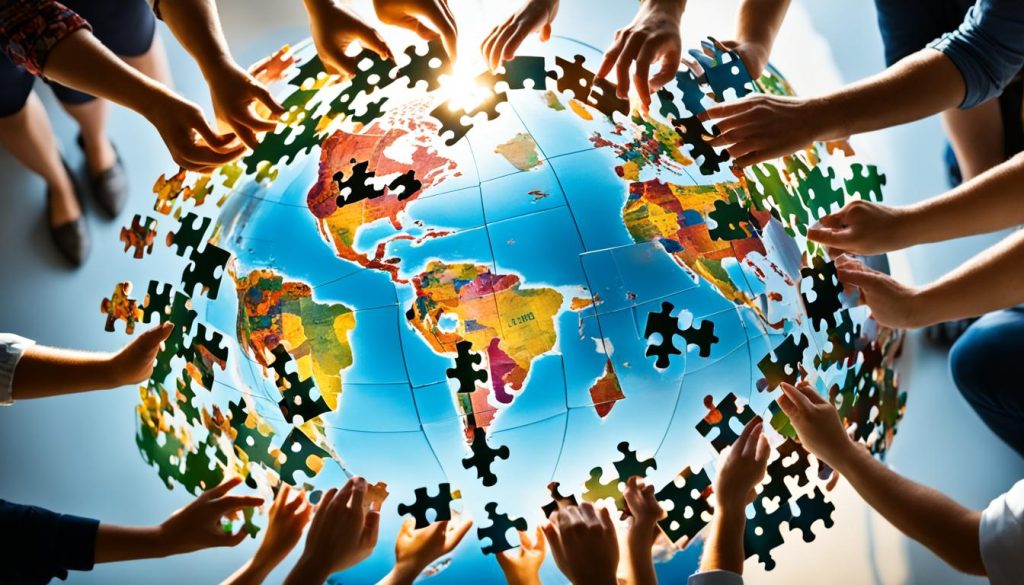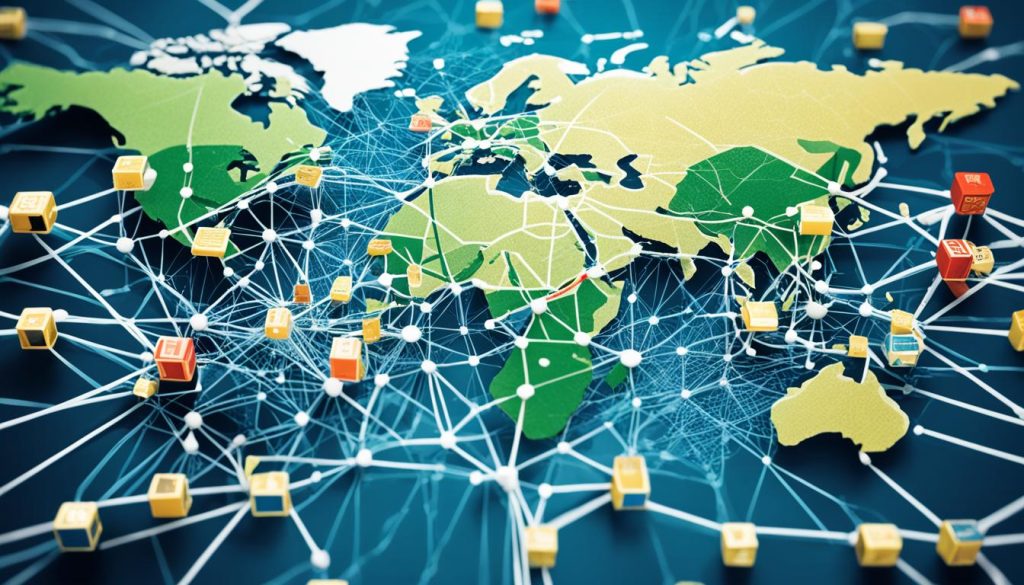Multinational corporations are changing the world’s economy. They influence international business greatly. Their large-scale operations and investments are spread across many areas. It’s important to know how they affect trade, jobs, and technology. This helps us understand their true global impact.
Key Takeaways
- Multinational corporations significantly shape international trade dynamics.
- They create substantial employment opportunities globally.
- These companies drive technological innovation and advancements.
- Multinational enterprises contribute to local economies and infrastructural growth.
- They have a socio-cultural impact through diversity and cultural exchange initiatives.
Global Trade Expansion by Multinational Businesses
Multinational corporations have greatly influenced global trade growth. They’ve managed to overcome trade barriers and complex rules. This has opened up the world market, allowing them and others to operate internationally. Such actions support economic progress worldwide.
Increased Market Accessibility
Multinationals like Amazon and Unilever help expand global trade by making markets more accessible. They invest heavily and form strategic partnerships to operate in many countries. This reduces tariffs and simplifies the trade of goods and services. Consequently, they’ve woven a tighter global market web. This enables local firms to reach customers around the world more easily.
Supply Chain Optimisation
Additionally, multinational companies boost global trade by streamlining supply chains. Giants such as Toyota and Samsung have set up efficient networks that cross continents. These advanced networks cut down costs and speed up production. Hence, global businesses gain a competitive edge. This makes the global trade scene stronger and more lively.
| Aspect | Description | Example Companies |
|---|---|---|
| Market Accessibility | Reducing tariff barriers and enabling the movement of goods and services | Amazon, Unilever |
| Supply Chain Optimisation | Enhancing efficiency and cost-effectiveness in international supply chains | Toyota, Samsung |
Employment Opportunities Created by Multinational Firms
Multinational corporations (MNCs) boost job growth in host countries. They expand overseas, bringing foreign direct investment. This helps the local economy grow.
Job Creation in Host Countries
Multinational firms create many jobs in host countries. They open new offices and factories, offering various jobs. This reduces unemployment and boosts the nation’s economy.
Cross-border Job Mobility
Multinational corporations make it easier for jobs to move across borders. They let skilled workers transfer internationally. This diversity enriches the workforce and spreads culture.
Here’s a table showing multinational firms’ impact on employment in different areas:
| Region | Job Creation | Skilled Workforce Migration |
|---|---|---|
| North America | High | Moderate |
| Europe | Moderate | High |
| Asia | Significant | High |
| Latin America | Moderate | Low |
The link between multinational businesses and host nations is clear. They boost job growth and support the global economy. By attracting skilled workers, these firms enrich local markets.
Cultural Exchange and Diversity Initiatives

Multinational businesses are key in bringing different cultures together at work. They champion diversity and make sure everyone feels included. This creates a place where all employees can do their best work.
Promotion of Cultural Awareness
Multinational companies boost cultural understanding among their teams. They do this with training, celebrating various cultures, and pushing for team members to talk with those from different backgrounds. Google and Unilever, for example, hold events that let people share and learn about diverse traditions. This builds a worldwide family feeling and knowledge.
Workfare Diversity Programs
To find and keep talent from around the world, big companies have diversity plans in place. These plans are all about making sure the workplace welcomes everyone, no matter their background. Microsoft and IBM lead by example. They have strong diversity rules and hire people in a way that values everyone’s differences.
- Google: Hosts various cultural events to promote understanding and respect among employees.
- Unilever: Encourages cross-cultural communication through training programmes.
- Microsoft: Implements strategic diversity initiatives to build an inclusive environment.
- IBM: Sets industry benchmarks with comprehensive hiring practices aimed at diversity and inclusion.
Well-thought-out cultural integration programs boost happiness at work and lead to new ideas and better competition. This highlights the big role multinational companies have in improving how people work together.
| Company | Initiative | Outcome |
|---|---|---|
| Cultural events | Enhanced understanding and respect among employees | |
| Unilever | Cross-cultural communication training | Increased cultural awareness and cohesion |
| Microsoft | Diversity initiatives | Inclusive workplace environment |
| IBM | Inclusive hiring practices | Industry benchmarks in diversity |
Technological Advancements and Innovation
Multinational companies are at the forefront of new tech, pushing the world forward. They invest heavily in research and development (R&D). This boosts innovation and spreads new technologies across different areas.
Investment in Research and Development
Investing in R&D is key for these corporations to make new leaps in technology. They pour money and effort into research. This not only moves their industries ahead but also sharpens their competitive edge. It keeps them leading in innovation and discovery.
Technology Transfer to Developing Nations
Multinationals also help developing countries by sharing technology. This gives these regions a chance to grow technologically. Sharing knowledge and training, and building partnerships boosts local innovations. It makes a global impact, helping everyone move forward together.
| Aspect | Benefit |
|---|---|
| R&D Investment | Accelerates technological discoveries and maintains competitive advantage. |
| Innovation Ecosystems | Fosters an environment of continuous advancement and collaboration. |
| Technology Transfer | Empowers developing nations with access to advanced technologies and practices. |
Economic Development and Infrastructure Improvements
Multinational corporations are key to economic growth and improving infrastructure in host countries. They use their resources and build partnerships to help local areas develop. This leads to long-term socio-economic benefits.
Boosting Local Economies
Multinational corporations invest in local economies, creating jobs and boosting economic activity. They often take part in public-private partnerships, improving community welfare. They bring in money and expertise, raising living standards and economic stability.
- Creation of new job opportunities
- Development of local industries
- Increased consumer spending
Infrastructure Projects
Investing in infrastructure is vital for continuous economic growth. Multinational companies tackle big infrastructure projects like roads and utilities through partnerships. Such projects use resources efficiently and bring advanced technology. Improved infrastructure makes business operations smoother and life better for locals.
- Construction of transportation networks
- Development of energy and utility services
- Implementation of technology-based infrastructure solutions
| Project Type | Impact on Local Economy | Partners Involved |
|---|---|---|
| Transport Networks | Improved connectivity and reduced logistics costs | Government, Multinational Corporations |
| Energy Services | Reliable power supply, support for local businesses | Local Utilities, Multinational Energy Firms |
| Technology Infrastructure | Enhanced digital economy, job creation in tech sectors | Tech Firms, Government Agencies |
Environmental Impacts of Multinational Corporations
Multinational corporations (MNCs) heavily influence our planet. They can both harm and help the environment with their activities. They face a challenge in balancing growth with keeping the planet safe.
Sustainable Practices Adoption
Many big companies are working to be more eco-friendly. They are adopting practices that lessen their harm to the environment. This includes cutting down on emissions, using renewable energy, and recycling more.
For example, Unilever and IKEA have set high environmental goals. It shows how important it is for them to be responsible about nature. This is a key part of their business plans.
Environmental Degradation Concerns
However, not all news is good. Some corporations damage nature by causing deforestation, polluting water, and destroying animal homes. These actions show why we need stronger rules for corporate environmental care.
Mining operations, like those by Rio Tinto, are often criticized for their environmental impact. There’s a strong demand for better laws to control such activities.
It’s crucial to understand how MNCs affect the environment in two ways. As they aim for green goals, finding a balance between profit and protecting the earth is crucial.
Corporate Social Responsibility (CSR) Initiatives
Multinational businesses now see the value in CSR programs. These efforts help lessen their impact on society and the environment. They show companies are serious about doing good things and helping communities grow. Nestlé, for example, focuses on getting its supplies in a way that is fair and helps local farmers thrive.
Unilever has a plan called the Sustainable Living Plan. It aims to improve people’s health, happiness, and income. These CSR efforts do more than help communities. They also make people see the company as one that cares about doing things the right way.
Here is a look at how different multinational companies tackle CSR. They each have their own ways of doing good and supporting communities:
| Company | CSR Initiative | Impact |
|---|---|---|
| Nestlé | Sustainable Sourcing | Better lives for farmers, fair sourcing |
| Unilever | Sustainable Living Plan | Improved health and well-being in communities |
| Coca-Cola | Replen. Africa Initiative | Clean water for many in Africa |
| Toyota | Environmental Challenge 2050 | Less carbon, saving resources |
These examples show how more companies are acting responsibly. They are making a real difference in communities and setting high standards for ethical business everywhere.
Impacts on Local Businesses and Competition
Multinational companies greatly affect local markets. They challenge and offer chances for small and medium businesses (SMEs). Their arrival changes market dynamics.
Challenges for Small Enterprises
SMEs face big challenges when multinationals come in. These giants have more resources, better technology, and wider reach. This situation makes it hard for smaller businesses to enter the market or grow.
Local companies struggle to compete. They may lose profits and market share to these larger corporations.
Opportunities for Local Partnerships
But, there’s a bright side. Local businesses can find new opportunities through partnerships with big firms. These alliances can bring knowledge, extend market presence, and boost innovation.
Working together can benefit everyone. It helps small businesses grow in competitive markets.
| Aspect | Challenges | Opportunities |
|---|---|---|
| Market Competition | High barriers to entry | Collaboration for mutual benefit |
| Resources | Limited for SMEs | Access to advanced technologies |
| Innovation | Underfunded R&D | Joint development efforts |
Regulatory and Policy Influence

Multinational corporations (MNCs) have a big impact on rules and policies. They shape local regulations and lobby governments. Their influence stretches from local levels to the global stage.
Impact on Local Regulations
Multinational companies really change local rules. They often set higher standards. This pushes changes in local laws to match the best practices worldwide. Companies like Unilever and Google lead these changes. They focus on things like environmental care and keeping data safe.
Their impact works two ways. It raises standards but can be hard for local businesses. However, meeting these new standards can make local economies stronger and more innovative.
Lobbying and Policy Advocacy
Through lobbying and advocacy, multinationals influence policies. They ensure the rules support their business needs. This happens at all levels of government. For example:
- Microsoft shapes laws on tech.
- BP talks to governments about energy.
- Amazon works to influence online shopping rules.
By lobbying, these big companies make sure policies help their businesses. This is good for their long-term plans and economic goals.
| Company | Policy Advocacy Efforts | Outcome |
|---|---|---|
| Microsoft | Technological laws and privacy regulations | Enhanced data protection frameworks |
| BP | Energy policy shaping | Support for sustainable energy initiatives |
| Amazon | E-commerce regulation lobbying | Favourable online retail legislations |
Consumer Behaviour and Preferences
Exploring consumer behaviour and preferences is key for large companies to stay ahead. By watching consumer trends, these companies can make better strategies. These strategies make their brand stronger and gain customer loyalty. As needs change, companies need to quickly adapt their products.
Brand Loyalty and Trust
Being loyal to a brand and trusting it are big deals in consumer choices. Big businesses work hard to make their brand seem trustworthy. This encourages people to buy again and creates lasting relationships. Brands like Apple and Nike show how to win customer loyalty with good quality and strong marketing. Their success leads to powerful consumer trends and a big market share.
Shifts in Consumer Demand
Consumer demand has changed a lot lately due to new technology and changes in society. Companies that keep up with these changes do well. For example, Amazon and Tesla adjust their products to fit what people want now. This way, they keep their brand strong and stay top in the market.
To show the effect of these changes, let’s compare:
| Company | Adaptation Strategy | Impact on Brand Perception |
|---|---|---|
| Amazon | Introduction of quick delivery options like Amazon Prime | Increased convenience, higher customer satisfaction |
| Tesla | Development of affordable electric car models | Adoption of sustainable practices, tech leadership |
| Unilever | Launch of eco-friendly and health-conscious product lines | Enhanced brand image, appeal to eco-conscious consumers |
Understanding and reacting to consumer trends keeps big companies competitve. It helps them create lasting loyalty and trust, in a world that’s always changing.
Educational and Training Programmes
Big businesses are important for helping people learn and improve their skills. They prepare workers for a changing work scene. This helps create a culture where learning never stops.
Skill Development Initiatives
Top companies have started many programmes to make their staff better. These include:
- Technical training sessions
- Soft skills workshops
- Leadership development courses
Through these programmes, workers learn new technical skills and improve on soft skills. This makes the entire workforce more educated.
Partnerships with Educational Institutions
Companies work with schools to help with skills training. They support many activities, such as:
- Funding for research projects
- Internship programmes
- Joint development of curricula
This teamwork with schools makes it easier for students to move into jobs. It helps get them ready for work and fills the skills shortage.
How Globalisation is Driven by Multinational Corporations

Multinational corporations are key players in globalisation. They expand aggressively into new markets and link their supply chains worldwide. This effort makes countries more connected and dependent on each other economically.
Expansion into Emerging Markets
Emerging markets offer big chances and hurdles for big companies. These corporations enjoy lower costs and new customers in these places. Countries like India, Brazil, and China are ripe with opportunities for making more money.
Entering these areas also helps lessen the impact of economic downturns in rich countries. Thus, doing well in these parts is essential for driving globalisation.
Global Supply Chain Integration
Managing supply chains well is crucial for these corporations’ strategies. By linking their supply chains globally, they make production and delivery smoother. This boosts efficiency and cuts down on costs.
Using the latest tech helps make these processes even better. Brands like Apple and Toyota show how well this can be done. Their efforts ensure products are delivered fast and reliably worldwide. This not only connects the world more but also keeps these companies strong in the market.
- Enhanced Efficiency
- Reduced Operational Costs
- Advanced Technological Implementation
- Swift Product Delivery
| Market | Opportunities | Examples |
|---|---|---|
| India | High consumer base, cost-effective labour | Walmart, Amazon |
| Brazil | Growing middle class, resource-rich | Nestlé, Volkswagen |
| China | Massive production capabilities, expanding market | Apple, Starbucks |
In conclusion, entering new markets and integrating supply chains are how corporations drive globalisation. These moves open up economic chances and promote growth and connection worldwide.
Economic Inequality and Wealth Distribution
Big companies around the world have a huge impact on money and wealth gaps. They make a lot of money and their large-scale operations often mean wealth is not shared equally. This leads to big gaps in income.
Income Disparities
The way big companies operate can widen the gap between rich and poor. The top bosses and big shareholders get a lot more money, leaving less for the everyday workers and local communities. This unfair sharing of money makes the rich richer and the poor poorer.
Corporate Taxation Issues
Multinational companies also dodge taxes, making it harder to spread wealth fairly. They use tricky tax plans to pay as little as possible. This means there’s less money for public services, and small businesses and people end up paying more taxes.
Here’s a comparison of how these issues play out:
| Aspect | Multinational Corporations | Local Businesses |
|---|---|---|
| Executive Compensation | Significantly Higher | Moderate |
| Employee Benefits | Diverse and Extensive | Limited |
| Tax Obligations | Often Minimized | Directly Impacted |
What are some effects of multinational businesses?
Multinational businesses have a huge role in the world. They boost economic development by creating jobs, bringing new technologies, and starting infrastructure projects. They support economic growth, mainly in less developed countries, by putting money into local efforts.
They also impact society and culture greatly. These companies help people from different backgrounds connect and understand each other better. They use diversity programmes and employee exchanges to make the places they work in more inclusive.
But, their influence isn’t all good. They are often criticised for harming the environment. While they sometimes try to use green methods, problems like pollution are still issues.
Multinational companies can affect local shops and firms in different ways. They bring competition, which makes local businesses get more creative. However, they can also overpower small businesses, which can harm the local market. Teaming up with local firms is one way they try to fix this.
When talking about global business consequences, their power to change rules and laws is something to watch. They use their money and power to push for changes that benefit them, influencing both local and global policies.
| Impact Area | Positive Effects | Negative Effects |
|---|---|---|
| Economic | Job Creation, Infrastructure Development | Economic Inequality |
| Sociocultural | Cultural Exchange, Diversity Initiatives | Cultural Homogenisation |
| Environmental | Sustainable Practices | Environmental Degradation |
| Local Business | Innovation Stimulation, Partnerships | Small Business Competition |
| Regulatory | Policy Advancements | Lobbying Influence |
Political Influence of Multinational Firms
Multinational firms hold a lot of power in politics, affecting economies and politics world-wide. They use their vast resources to influence election outcomes and push policies that benefit them. Here, we’re going to look at how they use their money to sway political campaigns and impact international diplomacy.
Political Campaign Contributions
Multinational companies use their wealth to get political advantages. By donating to political campaigns, they can influence laws and regulations. This is seen with big firms like ExxonMobil and Google, who invest heavily in politics to protect their interests.
Influence on International Relations
These firms also have a big impact on global diplomacy. Since they operate in many countries, they help shape relationships between governments. Deals with tech giants like Apple or Samsung can affect trade and policies, showing how business and international politics are connected.
To sum up, the political power of multinational firms is huge, through financing campaigns and affecting global diplomacy. Their influence is a key issue, showing how businesses can shape policies both at home and abroad.
















